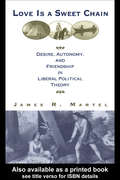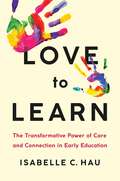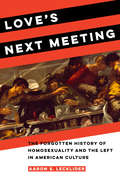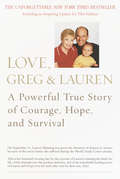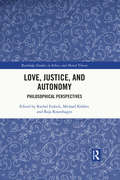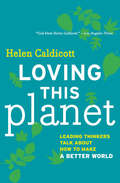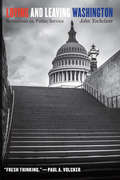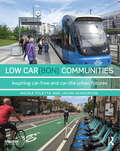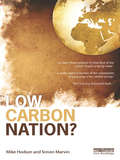- Table View
- List View
Love as Always, Mum xxx: The true and terrible story of surviving a childhood with Fred and Rose West
by Mae West'A CHILLING new memoir by the daughter of mass murderer Fred West and his wife Rose describes the savage cruelty of her upbringing in 25 Cromwell Street, Gloucester' DAILY MAIL'Mae, I mean this ... I'm not a good person and I let all you children down ...' Rose West, HM PRISON DURHAM It has taken over 20 years for Mae West to find the perspective and strength to tell her remarkable story: one of an abusive, violent childhood, of her serial killer parents and how she has rebuilt her life in the shadow of their terrible crimes. Through her own memories, research and the letters her mother wrote to her from prison, Mae shares her emotionally powerful account of her life as a West. From a toddler locked in the deathly basement to a teen fighting off the sexual advances of her father, Mae's story is one of survival. It also answers the questions: how do you come to terms with knowing your childhood bedroom was a graveyard? How do you accept the fact your parents sexually tortured, murdered and dismembered young women? How do you become a mother yourself when you're haunted by the knowledge that your own mother was a monster? Why were you spared and how do you escape the nightmare?What other readers are saying about Love as Always, Mum xxx:'A fascinating read. Mae West seems like such a warmhearted and caring person. It was heart-breaking to hear about what she went through.' 5* Goodreads'This book is truly moving in many ways and as much as I want to say I enjoyed it, I didn't, because it was heart-wrenching, but that's why it's a 5-star read. So much emotion and truth. It's definitely hard not to be moved by this.' 5* Goodreads'This is an extremely important story to read, giving Mae a voice to be verbal about breaking the cycle of abuse and surviving a terror she never thought she would be a part of. And because of that, it deserves five stars.' 5* Goodreads'This has got to be the most heartbreaking and emotionally demanding book I have ever read ... a heart wrenching and powerful read.' 5* Goodreads'As an avid reader of true crime books I had read a lot about Feed and Rose West. However with all of those books I had never considered their surviving children. This feels like such a raw, honest and real account of day to day life in 25 Cromwell Street. Good on you Mae for your strength to tell your story.' 5* Goodreads'A hauntingly tragic book. I couldn't put it down from start to finish.' 5* Goodreads
Love in Action
by Thich Nhat Hanh Foreword by Daniel BerriganLove in Action is a collection of more than two decades of Thich Nhat Hanh's seminal writings on nonviolence, peace, and reconciliation. Reflecting on the devastation of war--from Vietnam to the Persian Gulf--Nhat Hanh speaks in the tradition of Gandhi and King of the need for mindfulness, and altruistic love as the basis for political action. "Exploring the roots of war or describing the path to peace, nobody makes more sense than Thich Nhat Hanh. "--Inquiring Mind "[Nhat Hanh] articulates the central teaching that violence originates in each person. . . and that with the practice of mediation and mindfulness it can be overcome. "--The San Francisco Chronicle
Love in Action, Second Edition: Writings on Nonviolent Social Change
by Thich Nhat HanhBe inspired by 21 key writings on nonviolence and reconciliation by Vietnamese peace activist and refugee advocate Zen master Thich Nhat Hanh"The essence of nonviolence is love," Thich Nhat Hanh says. "Out of love and the willingness to act selflessly, strategies, tactics, and techniques for a nonviolent struggle arise naturally." Collecting essays written by Thich Nhat Hanh at crucial moments of social transformation, Love in Action is an important resource for anyone engaged in social work, community organizing, political action, and cause-oriented movements. Reflecting on the devastation of war, Thich Nhat Hanh makes the strong argument that ethics and altruistic love based on mindfulness and insight are the only truly sustainable bases for political action. Having played a central role in the Buddhist nonviolent movement for peace in Vietnam during the 1960s and serving as Chair of the Buddhist Peace delegation to the Paris Peace Accords in 1973, Thich Nhat Hanh speaks with the voice of experience: "There is no way to peace. Peace is the way."Together with essays on the connections between outer engagement and the inner work for peace, this anthology also features poetry and the script of the hauntingly beautiful 1972 play, The Path of Return Continues the Journey. The play's characters are drawn from the author's own life, the young men and women of his School of Youth for Social Service--many of whom were killed for their social actions. "At 12:30 a.m. on July 5, 1967, in the village of Binh Phuoc, Gia Dinh Province, a group of strangers abducted five young men, brought them to the bank of the Saigon River, and shot them," reports Thich Nhat Hanh. "All five were volunteer workers in the School of Youth for Social Service, a nonviolent organization that sought only to heal the wounds of war and reconstruct the villages." An elegy and a prayer for peace, the script shows a less-known side of the young Thich Nhat Hanh: grieving, profoundly in touch with his sorrow and pain, and channeling his anguish into art, inspired by love.
Love in Contemporary Technoculture (Elements in Histories of Emotions and the Senses)
by Ania MalinowskaThis Element outlines the environments of loving in contemporary technoculture and explains the changes in the manner of feelings (including the experience of senses, spaces, and temporalities) in technologically mediated relationships. Synchronic and retrospective in its approach, this Element defines affection (romance, companionship, intimacy etc.) in the reality marked by the material and affective 'intangibility' that has emerged from the rise of digitalism and technological advancement. Analysing the (re)constructions of intimacy, it describes our sensual and somatic experiences in conditions where the human body, believed to be extending itself by means of the media and technological devices, is in fact the extension of the media and their technologies. It is a study that outlines shifts and continuums in the 'practices of togetherness' and which critically rereads late modern paradigms of emotional and affective experiences, filling a gap in the existing critical approaches to technological and technologized love.
Love in the Balance
by Marianne K. Martin"Not only does [Love in the Balance] have love and excitement, but it has issues very close to all of us."-The Alabama Forum Gaiety"Marianne Martin is a wonderful storyteller and a graceful writer with a light, witty touch with language and a sensitivity to the emotions of people in love."-Ann BannonReal life has a way of sneaking up on you.Connie likes men. Sure, she's just dumped one, but she'll find another one soon enough. Instead she finds Kasey. Who happens to be a woman-a lesbian, actually. Connie reckons they'll be good friends, and she soon realizes she wants more.But Kasey has already had her heart broken. Her ex-girlfriend turned out to like men. Kasey won't take a chance on that happening again. And her friends won't let her, either. Especially not Sharon.If this is love, Connie has a lot of convincing to do and a lot of people to win over. Just when it seems like maybe she has, real life comes sneaking up again. Some people hate lesbians-hate them enough to kill. And it's not obvious that the authorities care. Connie and Kasey and Sharon must each put their doubts to the side and work together to get justice.Marianne K. Martin is the author of eight novels and has been shortlisted three times for the Lambda Literary Award.
Love in the Time of Hate: In the Mirror of Urdu
by Dr Rakhshanda JalilKabhi hum bhi tum bhi thhe aashna tumhein yaad ho ke na yaad ho Once you and I were friends, whether you remember it now or not--Momin Khan Momin This is a book about love—love for one&’s country and for all that goes to make it one we can be proud to belong to. Poetry, it has been said, flourishes when all else is uncertain. With that in mind, renowned literary historian and translator, Rakhshanda Jalil, uses Urdu poetry to look at how the social fabric of secular India is changing. Rakhshanda delves into the past, to the events that have threatened communal harmony, from the bloodletting of partition, or the politics of successive elections, to communal riots, Mumbai, Gujarat and so on, to the present moment, to recent events around Ayodhya, cow slaughter and &‘love jihad&’. The book is divided into four sections: politics, people, passions, places. Strewn with delightful, thoughtful Urdu couplets that bring depth, lyricism and gravitas to the narratives, the writer cautions us against current popular sentiments based on hating the &‘other&’. Living in an India that now requires us to be resolutely one or the &‘other&’, all of us are losing the wonderful capacity to contain within ourselves many seemingly diverse ideologies and beliefs which is a motif that is reiterated through the verses and words in this book. The section titled &‘People&’ has the most delightful, charming vignettes of popular icons, from Tipu Sultan and Rani Lakshmi Bai to Gandhi and Nehru, from Ghalib and Majaz to Dilip Kumar and Lata Mangeshkar, viewed through an Urdu lens that makes each person memorable, unique and an advocate of peace and unity. From essays doused in the language of secular patriotism like Har Dil Tiranga, to pieces redolent with nostalgia like Dopahar ki Dhoop Mein, Rakhshanda invokes the power of love, inclusivity and communal harmony that is the trademark of poetry and literature, and which must continue to permeate the way we live our lives if we want to bequeath a meaningful legacy to the generations to come in our country.
Love is a Sweet Chain: Desire, Autonomy and Friendship in Liberal Political Theory
by James MartelNotions of love intersect with ideas on personal liberty, obligation, individuality, self, and difference in this study. James Martel contends that theorists' inattention to the subject has impoverished our explorations of political discourse.
Love to Learn: The Transformative Power of Care and Connection in Early Education
by Isabelle C. HauThe most important aspect of early childhood in general and education in particular is the quality and care of the relationships a child forms. Love to Learn shows how to build and develop these relationships -- and unlock every child's true potential. Early relationships are the key to healthy brain development, resilience, and lifelong flourishing. Children need to be loved, to be valued, to interact, and to be listened to. When children have the space and time to play and explore through nurturing positive relationships, then children learn. But loving relationships are precisely what so many children are missing, and modern factors are making it more difficult for children to build these necessary bonds. Kids are growing up in smaller families with fewer siblings, and in more single-parent households. They have fewer adult family friends and mentors. They have less contact with grand-parents and grand-adults. They spend 60% less time with friends than children did a decade ago. They play outside less—half the time spent by their parent&’s generation. They find themselves increasingly immersed in solitary realms of screens, a modern sanctuary where parents seek refuge as well. Many kids are so overscheduled they have less time to build friendships Love to Learn offers a vision for a future where learning is relational, and love is a literacy. It is a provocative paradigm shift, from child-centered education to relationship-centered learning. It weaves in stories of perseverance, empathy, creativity, and showcases innovations anchored in the latest neuroscience and technology advance – all driven by the desire to unlock the inherent human potential in any child. This hope-filled book seeks to change how we raise our children, how we run early learning environments, and how we construct care-full communities. It aims to inspire and engage readers, catalyze new solutions, and in doing so, change our understanding of childhood itself.
Love's Next Meeting: The Forgotten History of Homosexuality and the Left in American Culture
by Aaron LeckliderHow queerness and radical politics intersected—earlier than you thought. Well before Stonewall, a broad cross section of sexual dissidents took advantage of their space on the margins of American society to throw themselves into leftist campaigns. Sensitive already to sexual marginalization, they also saw how class inequality was exacerbated by the Great Depression, witnessing the terrible bread lines and bread riots of the era. They participated in radical labor organizing, sympathized like many with the early prewar Soviet Union, contributed to the Republicans in the Spanish Civil War, opposed US police and state harassment, fought racial discrimination, and aligned themselves with the dispossessed. Whether they were themselves straight, gay, or otherwise queer, they brought sexual dissidence and radicalism into conversation at the height of the Left's influence on American culture. Combining rich archival research with inventive analysis of art and literature, Love’s Next Meeting explores the relationship between homosexuality and the Left in American culture between 1920 and 1960. Aaron S. Lecklider uncovers a lively cast of individuals and dynamic expressive works, revealing remarkably progressive engagement with homosexuality among radicals, workers, and the poor. Leftists connected sexual dissidence with radical gender politics, antiracism, and challenges to censorship and obscenity laws through the 1920s and 1930s. In the process, a wide array of activists, organizers, artists, and writers laid the foundation for a radical movement through which homosexual lives and experiences were given shape and new political identities were forged. Love's Next Meeting cuts to the heart of some of the biggest questions in American history: questions about socialism, about sexuality, about the supposed clash still making headlines today between leftist politics and identity politics. What emerges is a dramatic, sexually vibrant story of the shared struggles for liberation across the twentieth century.
Love, Anarchy, & Emma Goldman: A Biography
by Candace Falk“What this remarkable book does . . . is to remind us of that passion, that revolutionary fervor, that camaraderie, that persistence in the face of political defeat and personal despair so needed in our time as in theirs.” —Howard Zinn “Fascinating …With marvelous clarity and depth, Candace Falk illuminates for us an Emma Goldman shaped by her time yet presaging in her life the situation and conflicts of women in our time.” —Tillie Olsen One of the most famous political activists of all time, Emma Goldman was also infamous for her radical anarchist views and her “scandalous” personal life. In public, Goldman was a firebrand, confidently agitating for labor reform, anarchism, birth control, and women’s independence. But behind closed doors she was more vulnerable, especially when it came to the love of her life. Reissued on the sesquicentennial of Emma Goldman's birth, Love, Anarchy, & Emma Goldman is an account of Goldman’s legendary career as a political activist. But it is more than that—it is the only biography of Emma Goldman. The flow of her life and words is at its core. Here, Candace Falk offers an intimate look at how Goldman’s passion for social reform dovetailed with her passion for one man: Chicago activist, hobo king, and red-light district gynecologist Ben Reitman. This takes us into the heart of their tumultuous love affair, finding that even as Goldman lectured on free love, she confronted her own intense jealousy. As director of the Emma Goldman papers, Falk had access to over 40,000 writings by Goldman—including her private letters and notes—and she draws upon these archives to give us a rare insight into this brilliant, complex woman’s thoughts. The result is both a riveting love story and a primer on an exciting, explosive era in American politics and intellectual life.
Love, Greg & Lauren
by Greg ManningEarly on the morning of September 11, 2001, Lauren Manning-a wife, the mother of a ten-month-old son, and a senior vice president and partner at Cantor Fitzgerald-came to work, as always, at One World Trade Center. As she stepped into the lobby, a fireball exploded from the elevator shaft, and in that split second her life was changed forever. Lauren was burned over 82. 5 percent of her body. As he watched his wife lie in a drug-induced coma in the ICU of the Burn Center at New York-Presbyterian Hospital, Greg Manning began writing a daily journal. In the form of e-mails to family, friends, and colleagues, he recorded Lauren’s harrowing struggle-and his own tormented efforts to make sense of an act that defies all understanding. This book is that e-mail diary: detailed, intimate, inspiring messages that end, always, as if a prayer for a happy outcome: LOVE, GREG & LAUREN We share this story day by astonishing day. Greg writes of the intricate surgeries, the painful therapies, and the constant risk of infection Lauren endured. Through his eyes we come to know the doctors, nurses, aides, and therapists who cared for her around the clock with untiring devotion and sensitivity. We also come to know the families with whom he shared wrenching hospital vigils for their own loved ones who were waging a battle that some would not win. It was, most of all, Greg’s belief that Lauren would win her brave fight for life that kept him writing. Through his eyes we see what she could not-their toddler’s first steps, the video of his first birthday party, the compassionate messages of hope from around the world. And we are there as Lauren gradually emerges into awareness, signaling first with her eyes, then with smiles, her understanding of the words Greg speaks to her, the poems he recites, the songs he plays. Most miraculously, we are there when Lauren walks out of the Burn Center. The world knows all too well both the nightmare and the heroism that have marked this terrible time in history. But no account of September 11 matches the astonishing personal story Greg Manning records in these spontaneous and heartfelt pages. It is a story that invites us to share, e-mail after e-mail, the perilous course of a mortally wounded woman who by sheer will and courage emerges from near death because she is determined to live for her husband and her son. And it is equally the story of a man who, as he stays by her side through these long weeks and months, discovers anew the depth of his love and admiration for the woman who becomes his hero.
Love, Hate & Clickbait: A Novel
by Liz BoweryA MOST ANTICIPATED BOOK SELECTED BY BUZZFEED & THE NERD DAILY"Quick-paced, sharp, and thoroughly entertaining. I couldn&’t put it down!&”—Helen HoangShake some hands. Kiss some coworkers.Cutthroat political consultant Thom Morgan is thriving, working on the governor of California&’s presidential campaign. If only he didn&’t have to deal with Clay Parker, the infuriatingly smug data analyst who gets under Thom&’s skin like it&’s his job. In the midst of one of their heated and very public arguments, a journalist snaps a photo, but the image makes it look like they&’re kissing. As if that weren&’t already worst-nightmare territory, the photo goes viral—and in a bid to secure the liberal vote, the governor asks them to lean into it. Hard.Thom knows all about damage control—he practically invented it. Ever the professional, he&’ll grin and bear this challenge as he does all others. But as the loyal staffers push the boundaries of &“giving the people what they want,&” the animosity between them blooms into something deeper and far more dangerous: desire. Soon their fake relationship is hurtling toward something very real, which could derail the campaign and cost them both their jobs…and their hearts.
Love, Hate and the Leader: A Fascist Childhood (Routledge Studies in Fascism and the Far Right)
by Trevor GrundyLove, Hate and the Leader is a memoir of growing up in a Fascist family in post-war Britain. For Trevor Grundy and his family, Fascist leader Oswald Mosley was a God and antisemitism was a creed. His father was a Fascist brawler, his mother obsessed with Mosley and Grundy himself dreamed Mosley was his father and grew up to be the youngest member of the Fascist Union Movement to speak at Trafalgar Square. But, after her death, Grundy learnt that his mother was Jewish. The book features additional material from its original 1998 edition with more detail on Fascist figures in Grundy's childhood as well as his life after leaving the Fascist movement. This book will appeal to those interested in British Fascism, far-right history and family memoirs.
Love, Justice, and Autonomy: Philosophical Perspectives (Routledge Studies in Ethics and Moral Theory)
by Michael Kühler Rachel Fedock Raja RosenhagenPhilosophers have long been interested in love and its general role in morality. This volume focuses on and explores the complex relation between love and justice as it appears within loving relationships, between lovers and their wider social context, and the broader political realm. Special attention is paid to the ensuing challenge of understanding and respecting the lovers’ personal autonomy in all three contexts. Accordingly, the essays in this volume are divided into three thematic sections. Section I aims at shedding further light on conceptual and practical issues concerning the compatibility or incompatibility of love and justice within relationships of love. For example, are loving relations inherently unjust? Might love require justice? Or do love and justice belong to distinct moral domains? The essays in Section II consider the relation between the lovers on the one hand and their broader societal environment on the other. Specifically, how exactly are love and impartiality related? Are they compatible or not? Is it unjust to favor one’s beloved? Finally, Section III looks at the political dimensions of love and justice. How, for instance, do various accounts of love inform how we are to relate to our fellow citizens? If love is taken to play an important role in fostering or hindering the development of personal autonomy, what are the political implications that need to be addressed, and how? In addressing these questions, this book engenders a better understanding both of conceptual and practical issues regarding the relation between love, justice, and autonomy as well as their broader societal and political implications. It will be of interest to advanced students and scholars working on the philosophy of love from ethical, political, and psychological angles.
Love, Poverty, and War: Journeys and Essays (Nation Bks.)
by Christopher Hitchens"I did not, I wish to state, become a journalist because there was no other 'profession' that would have me. I became a journalist because I did not want to rely on newspapers for information. " Love, Poverty and War: Journeys and Essays showcases America's leading polemicist's rejection of consensus and cliché, whether he's reporting from abroad in Indonesia, Kurdistan, Iraq, North Korea, or Cuba, or when his pen is targeted mercilessly at the likes of William Clinton, Mother Theresa ("a fanatic, a fundamentalist and a fraud"), the Dalai Lama, Noam Chomsky, Mel Gibson and Michael Bloomberg. Hitchens began the nineties as a "darling of the left" but has become more of an "unaffiliated radical" whose targets include those on the "left," who he accuses of "fudging" the issue of military intervention in the Balkans, Afghanistan and Iraq. Yet, as Hitchens shows in his reportage, cultural and literary criticism, and opinion essays from the last decade, he has not jumped ship and joined the right but is faithful to the internationalist, contrarian and democratic ideals that have always informed his work.
Loved Egyptian Night: The Meaning of the Arab Spring
by Hugh RobertsWhy did the Arab Spring have such calamitous outcomes?Loved Egyptian Night fundamentally reassesses the Arab Spring, refuting the stories the Western powers fed to the world. There is no doubt that the toppling of Ben Ali in Tunisia in January 2011 and what it led to amounted to a political revolution.But the uprisings in Egypt, Libya and Syria - countries with quite different histories and political traditions - were never revolutions. As Hugh Roberts explains, the bitter ends of these episodes were inscribed in their misunderstood beginnings. To celebrate these uprisings as 'revolutions' preempts and inhibits critical analysis and expresses an abdication of intellectual responsibility.After so much wishful thinking, what remains is the debris of a cynical pretension. Outside interference, ostensibly on behalf of these 'revolutions', reduced Libya to anarchy and condemned Syria to a devastating proxy war now in its twelfth year.In Egypt, the Free Officers' state was re-booted in its most brutal ever form. The Americans and Europeans did not vainly try to help the Egyptians or anyone else escape from authoritarian rule. Instead, they contrived to seal them up in it. The long oppression of these societies, Kipling&’s 'loved Egyptian night,' is not going to be ended by the Western powers; these days it is guaranteed by them.
Loving Susie (The Heartlands Series)
by Jenny Harper<p>She thought she knew her husband, but he's been keeping a secret ... about her.<p> <p>Scottish politician Susie Wallace is under pressure. She risks censure from her Party for her passionate and outspoken views on arts funding. A charity she's involved with runs into difficulties. And a certain journalist seems to have it in for her.<p> <p>Susie stumbles across some information that rocks her world but not, apparently, her husband's - Archie has been in on this particular secret for thirty years. Now Susie wonders if she can trust him at all. Soon, unemployed son Jonathan and successful daughter Mannie begin to feel the fallout too, fracturing the family and leaving Susie increasingly isolated.<p> <p>Troubled by mounting pressure from her family, her Party and the Press, Susie goes into hiding. The Party needs her back for a crucial vote, but more importantly, Archie knows he needs to find his wife quickly if they are to rebuild their relationship and reunite the family.<p>
Loving This Planet: Leading Thinkers Talk About How to Make A Better World
by Helen CaldicottConversations on sustainability, renewable energy, and other pressing issues: &“A level of intellectual discussion all too absent in our national discourse.&” —Booklist A co-founder of Physicians for Social Responsibility, named one of the most influential women of the twentieth century by the Smithsonian Institute, Helen Caldicott presents a valuable collection of her interviews with prominent figures and environmentalists—in which she: *Scrutinizes our unsustainable dependence on nuclear energy *Explores how the United States could transition to renewable energy *Raises awareness about issues such as deforestation and sea-level rise Extending well beyond the scope of conventional environmental discussions, this book gives us Martin Sheen on grassroots movements and unionized labor; Chris Hedges on the costs of standing up for your morals; and award-winning actress Lily Tomlin on contemporary politics, in a sarcastic and witty exchange at once hilarious and inspiring—and also includes interviews with Maude Barlow, Bill McKibben, Jonathan Schell, Daniel Ellsberg, Lester Brown, Frances Fox Piven, Bob Herbert, and more. &“A treasure trove of anecdotes featuring high-profile politicians, academics, and celebrities . . . Surprising statistics about nuclear waste storage, rising sea levels, and military spending serve as an alarm, but Caldicott and her collaborators also offer many innovative solutions.&” —Publishers Weekly &“God bless Helen Caldicott.&” —Los Angeles Times
Loving You, Thinking of You, Don't Forget to Pray: Letters to My Son in Prison
by Jacqueline L. Jackson Jesse L. Jackson Jr.From a mother, role model, and civil rights veteran, an inspiring gift of love to a child in his darkest hour.Jacqueline Jackson promised her son, Congressman Jesse L. Jackson, Jr., that she would write him every day during his incarceration in federal prison to serve his thirty-month sentence. This book is an inspiring and moving selection of the letters she wrote him. Together, they comprise a powerful act of love—nurturing and ministering to her son's heart, health, and mind and maintaining his essential connection with home. Frank, anecdotal, imbued with faith, and sometimes humorous, they offer intimate details from the family’s daily life, along with news of friends and the community and glimpses of such figures as Nelson Mandela, Winnie Mandela, and Mayor Marion Barry. They also touch eloquently on issues of social justice, politics, and history, as when Mrs. Jackson recalls growing up in Jim Crow Florida, and they reflect the qualities, instilled by her own mother, that made her a role model for much of her life. Ultimately, these letters offer a blueprint for why we have to support our families not just as they elevate but when they fall. This collection is Mrs. Jackson's contribution to healing during a time when our prisons are full and our communities are suffering. She provides the road map for ensuring that the individuals serving sentences understand that prison is where they are, not who they are and for helping them sustain the courage to keep hope alive.
Loving and Leaving Washington: Reflections on Public Service
by John YochelsonJohn Yochelson was seventeen when he first heard President Kennedy’s call, “Ask not what your country can do for you; ask what you can do for your country.” Responding to the call to public service, he had a front-row seat from the mid-1970s through the mid-1990s, when the power game in Washington was played across party lines. Loving and Leaving Washington is his inside account of the lives of public servants from the perspective of a lifelong moderate. The Center for Strategic and International Studies brought Yochelson into close contact with such heavyweights as Henry Kissinger and Federal Reserve chairman Paul Volcker; work with the Council on Competitiveness kept him at the center of action. But the rise of bare-knuckled partisanship soured him on DC. In 2001 he left power politics to fight for a cause that he believed in, launching a San Diego–based nonprofit to increase the participation of women and underrepresented minorities in science and engineering. Funding realities and family ties, however, drew him back to the Beltway. The bittersweet experience of disengaging from and returning to Washington prompted Yochelson’s candid look at the loss of middle ground in U.S. politics and the decline of public trust in government. In this illuminating memoir, he reflects on the current generation’s dedication to their country and considers the rewards, limitations, and uncertain future of public service.
Loving before Loving: A Marriage in Black and White
by Joan Steinau LesterCommitted to the struggle for civil rights, in the late 1950s Joan Steinau marched and protested as a white ally and young woman coming to terms with her own racism. She fell in love and married a fellow activist, the Black writer Julius Lester, establishing a partnership that was long and multifaceted but not free of the politics of race and gender. As the women’s movement dawned, feminism helped Lester find her voice, her pansexuality, and the courage to be herself. Braiding intellectual, personal, and political history, Lester tells the story of a writer and activist fighting for love and justice before, during, and after the Supreme Court’s 1967 decision striking down bans on interracial marriage in Loving v. Virginia. She describes her own shifts in consciousness, from an activist climbing police barricades by day and reading and writing late into the night to a woman navigating the coming-out process in midlife, before finding the publishing success she had dreamed of. Speaking candidly about every facet of her life, Lester illuminates her journey to fulfillment and healing.
Low Car(bon) Communities: Inspiring car-free and car-lite urban futures
by Jason Henderson Nicole FolettaWith increasing awareness of the urgent need to respond to global warming by reducing carbon emissions and recognition of the social benefits of car-free and car-lite living, more and more city planners, advocates, and everyday urban dwellers are demanding new ways of building cities. In Low Car(bon) Communities, authors Nicole Foletta and Jason Henderson examine seven case studies in Europe and the United States that aim explicitly to reduce dependency on cars. Innovative and inspirational, these communities provide a rich array of data and metrics for comparison and analysis. This book considers these low car(bon) communities’ potential for transferability to cities around the world, including North America. Aimed at practicing city planners, sustainable transportation advocates, and students in planning, geography, and environmental studies, this book will be an invaluable benchmark for gauging the success of sustainable urban futures.
Low Carbon Energy in the Middle East and North Africa (International Political Economy Series)
by Li-Chen Sim Robin MillsThis book explores the evolving roles of energy stakeholders and geopolitical considerations, leveraging on the dizzying array of planned and actual projects for solar, wind, hydropower, waste-to-energy, and nuclear power in the region. Over the next few decades, favorable economics for low carbon energy sources combined with stagnant oil demand growth will facilitate a shift away from today’s fossil fuel-based energy system. Will the countries of the Middle East and North Africa be losers or leaders in this energy transition? Will state–society relations undergo a change as a result? It suggests that ultimately, politics more so than economics or environmental pressure will determine the speed, scope, and effects of low carbon energy uptake in the region. This book is of interest to academics working in the fields of International Relations, International Political Economy, Comparative Political Economy, Energy Economics, and International Business. Consultants, practitioners, policy-makers, and risk analysts will also find the insights helpful.
Low Carbon Nation?
by Simon Marvin Mike HodsonWhat does the transition to a Low Carbon Britain mean for the future development of cities and regions across the country? Does it reinforce existing ‘business as usual’ or create new transformational opportunities? Low Carbon Nation? takes an interdisciplinary approach to tackle this critical question, by looking across the different dimensions of technological, scientific, social and economic change within the diverse city and regional contexts of the UK. Hodson and Marvin set out how the transition to low carbon futures needs to be understood as a dual response to the wider financial and economic crisis and to critical ecological concerns about the implications of global climate change. The book develops a novel framework for understanding how the transition to low carbon is informed by historical legacies that shape the geographical, political and cultural dimensions of low carbon responses. Through a programme of research in Scotland, Wales, the North East of England, Greater London, and Greater Manchester, the authors set out different styles of low carbon urban and regional response. Through in-depth illustration of this in newly devolved nations, an old industrial region, a global city-region and in an entrepreneurial city, international lessons can be drawn about the limits and the unrealised opportunities of low carbon transition. This book is key reading for students on geography, economics, planning and social science degrees, as well as those studying sustainability in related contexts trying to understand the urban and regional politics of low carbon transition. It is also an essential resource for policymakers, public officials, elected representatives, environmentalists and business leaders concerned with shaping the direction and type of transition.
Low Carbon Politics: A Cultural Approach Focusing on Low Carbon Electricity (Routledge Studies in Energy Policy)
by David TokeLow Carbon Politics focuses on how policies and institutions have influenced the deployment of renewable energy and nuclear power in the electricity sector. Cultural theory is used to analyse this. Egalitarian pressures have had a profound influence on technological outcomes, not merely in securing the deployment of renewable energy but also in increasing the costs of nuclear power. Whereas in the 1970s it might have been expected that individualist, market based pressures allied to dominant hierarchies would deliver nuclear power as the main response to problems associated with fossil fuels, a surprising combination has emerged. Egalitarian and individualist pressures are, together, leading to increasing levels of deployment of renewable energy. This work finds that electricity monopolies tend to favour nuclear power whereas competitive arrangements are more likely to lead to more renewable energy being deployed. It covers developments in a number of countries including USA, UK, China, South Africa and also Germany and Denmark. This book will be of great relevance to students, academics and policymakers with an interest in energy policy, low carbon politics and climate change.






